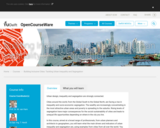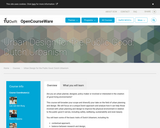
Urban design, inequality and segregation are strongly connected.
Cities around the world, from the Global South to the Global North, are facing a rise in inequality and socio-economic segregation. The wealthy are increasingly concentrating in the most attractive urban areas and poverty is spreading to the suburbs. Rising levels of segregation have major consequences for the social sustainability of cities and leads to unequal life opportunities depending on where in the city you live.
In this course, aimed at a broad range of professionals, from urban planners and architects to geographers, you will learn what the main drivers and indicators of urban inequality and segregation are, using examples from cities from all over the world. You will learn how segregation is measured, how to interpret the results of the analyses of segregation and how to relate these insights to urban design. With this knowledge, you will be able to analyze how these issues may be affecting your local environment.
Additionally, we will present some historical examples of how urban design has played a role shaping spatial inequality and segregation in a selection of case study cities. This will help you to get a better understanding of how urban design can reduce spatial inequality and segregation.
The course is taught by the editors of the new SpringerOpen book “Urban socio-economic segregation and income inequality. A global perspective” and senior experts from the Urban Design section of TU Delft, which is ranked number 2 in the QS World University Rankings in the field of Architecture.
- Subject:
- Applied Science
- Architecture and Design
- Engineering
- Material Type:
- Full Course
- Provider:
- Delft University of Technology
- Provider Set:
- TU Delft OpenCourseWare
- Author:
- Leo van den Burg
- Maarten van Ham
- Tanja Herdt
- Date Added:
- 01/17/2023
